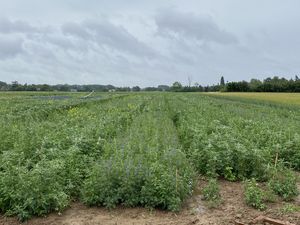Greenhouse gas reduction through innovative breeding advances in alternative plant protein sources (TRIP)

Objective
Plant breeding for alternative plant-based protein sources protein sources as a substitute for animal sources as well as model-based estimation of of climate protection potentials and investigation of socio-economic effects along the affected value chains from producers and processors to the consumers. Investigation of the climate effect based on an assessment of the product-specific carbon footprint of the milk and meat alternatives (e.g. oat drink).
Methodology
- Breeding of oats and lupin for higher protein content and improved amino acid profile as well as resistance to biotic pathogens (application of classical breeding approaches, establishment of tissue culture, new molecular techniques)
- Investigation of consumer acceptance of plant-based drinks, milk substitutes and meat substitutes made from oats and lupine
- Market and value chain analyses, including consideration of the costs of regulation or licensing procedures
- Assessments of possible development scenarios using the CAPRI agro-economic equilibrium model
Climate effect under consideration
Greenhouse gas reduction and carbon footprint of plant protein sources compared to animal protein and with changed consumer behaviour
Publications
Hunecke C,1) Thom F,1) Vogt J, Bellingrath-Kimura S D, Brück T, Gaupp F, Geppert F, Grune T, Herzfeld T, Kulling S E, Ojha S, Piorr A, Regierer B, Renner B, Schlüter O, Schreiner M, Springmann M, Weith T, Wiedmer P (1) shared first authorship) (2025): Sustainable and Resilient Agrifood Systems (SARAS). A Leibniz Position. Sustainable Development 33 (5): 6871. doi: 10.1002/sd.3468
Pathi KM, Sprink T (2025): Lupins in the Genome Editing Era: Advances in Plant Cell Culture, Double Haploid Technology and Genetic Transformation for Crop Improvement. Frontiers in Plant Science. doi. 10.3389/fpls.2025.1601216
Thom F, Beier F, Gibson M, Sundiang M, Chen D, de Lange T, Luchtenbelt H, Tassinari G, Mishra A, Dinaz Oliveira T (2025): Between code and conscience: early-career researcher reflections on agroeconomic modelling and international research collaboration. The Lancet Planetary Health, Volume 9, Issue 10, 101303. DOI: 10.1016/j.lanplh.2025.101303, https://www.sciencedirect.com/science/article/pii/S2542519625001810
Sundiang et al. (2025) Bundling measures for food systems transformation: a global, multimodel assessment. The Lancet Planetary Health, Volume 9, Issue 10, 101339. DOI: 10.1016/j.lanplh.2025.101339, https://www.sciencedirect.com/science/article/pii/S2542519625002177
Gibson M, Sundiang M, Mason-D’Croz D, Oliveira T D, Beier F, Benavidez L, Bos A, Chepeliev M, Doelman J, Dunston S, Fujimori S, Hasegawa T, Havlik P, Hristov J, Jägermeyr J, Kozicka M, Kuiper M, Kumar I, de Lange T, Bodirsky B, Lotze-Campen H, Luchtenbelt H, Chen D, Mishra A, Müller C, Nelson G, Pérez Domínguez I, Popp A, Sands R, Springmann M, Stehfest E, Sulser T, Takahashi K, Tassinari G, Thom F, Thornton P, Tommey J, Tsuchiya K, van Zeist W-J, van Meijl H, van der Mensbrugghe D, Palazzo A, van Vuuren D, van Zanten H, Weindl I, Wiebe K, Zhao X, Kyle P, Herrero M (resubmitted after revisions): Food systems transformation would imply a radical revaluing of global agriculture. Nature. Preprint available: doi.org/10.21203/rs.3.rs-6009571/v1
Karpinski, I, Ha, N, Forchert, M, Sabboura, D, Feike, T, Sprink, T, Hartung, F, Pathi, K, Herrmann, M, Sprycha, Y, Zaar, A, Thom, F (2024): Treibhausgasreduktion durch Forschung an pflanzlichen Proteinquellen – retten wir mit Haferdrinks das Klima? Getreide, Mehl und Brot, 30(3), 2–9. https://www.openagrar.de/re-ceive/openagrar_mods_00100066
Pathi & Sprink (2023): From Petri Dish to Field: Plant Tissue Culture and Genetic Engineering of Oats for Improved Agricultural Outcomes. Plants, 12, 3782
Contact persons
JKI, Institute for Biosafety in Plant Biotechnology
Thünen Institute, Institute of Farm Economics
Institute for Breeding Research on Agricultural Crops
Federal Office of Consumer Protection and Food Safety (BVL)
Dr. Nicola Consmüller
JKI, Institute for Strategies and Technology Assessment




